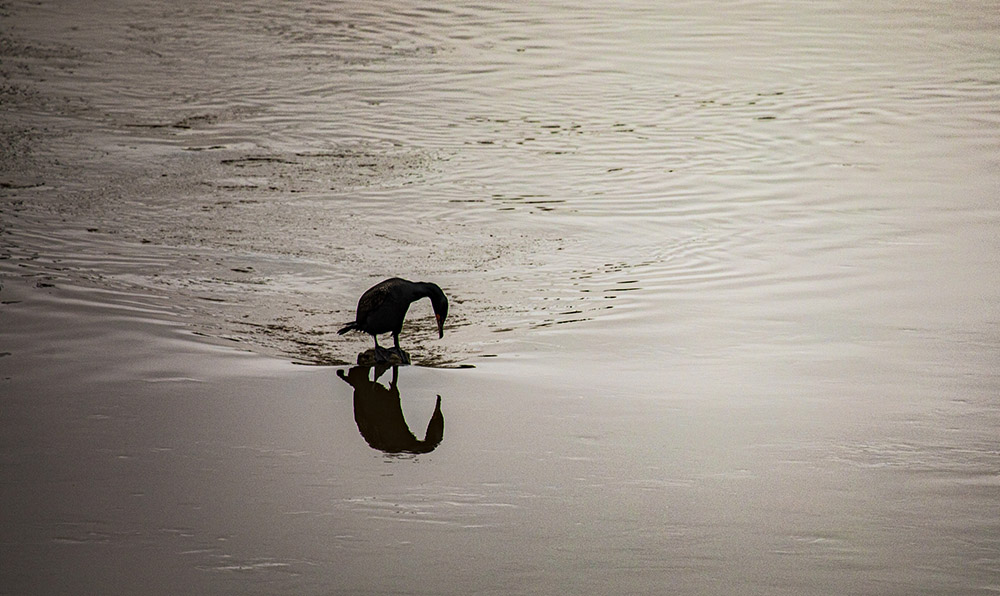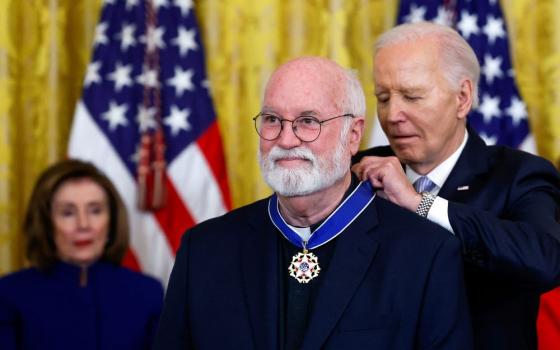
A cormorant is seen on the Anacostia River April 26, 2020, near Bladensburg, Maryland. (CNS/Chaz Muth)
"To you, O Lord, I lift my soul."
On this First Sunday of Advent, Catholics throughout the world are invited to sing this same psalm refrain. Do we mean it? As we prepare to celebrate the Incarnation, are we willing to dare to lift our soul, our very selves, in dialogue with God? Are we willing to look at our Earth from the divine perspective?
Often, our prayers sound like a "honey do" list telling God what should be on the divine agenda for the coming days. How often do we participate attentively in the liturgy's prayer of the faithful? (One of our sisters used to threaten to pray: "Gracious God, let the roof now fall in on our heads. Let us pray to the Lord." She wanted to know how many inattentive pew dwellers would piously reply, "Lord, hear our prayer.")
Even if we're not totally oblivious, many of us still need a good dose of Jesus' admonition, "Beware! Do not let your hearts become drowsy!"
Scripture leads us to discover that prayer is like a boomerang: We launch it only to have it come back at us. When Jesus told people that their faith had saved them, he was saying that God works through us, never replacing human effort nor overriding our freedom.
Grace is a collaborative affair. Genuine prayer implies that we are ready to do our part to bring about what we ask God to accomplish.
Back to the phrase, "To you, Lord, I lift my soul." If we awaken our hearts and listen to the power of these words, we might get the message that praying is supposed to lure us to boldly go where we have never gone before. Praying, "To you, Lord, I lift my soul" positions us for flight from everything trivial and egocentric.
These words proclaim our readiness to be moved beyond the wishful and limited horizon of our own concerns into a space that offers new perspectives. We have to travel beyond ourselves to understand and long for what prophets proclaim: "New days are coming!"
Jeremiah wrote the message we hear today for people who admitted that their lack of faithfulness had nearly destroyed them. They were desperate for help as they tried to reconstitute themselves after exile. Jeremiah promised that God would raise up prophets and rulers to lead them into justice.
Advertisement
Jesus proclaimed a similar message, assuring people that the time of their tribulation could also be the time of their salvation.
Today, Pope Francis is telling all of humanity that God still offers a new day, a time characterized by justice and reverence for Earth and all her creatures. Jeremiah, Jesus and Francis have united to prod us to lift up our soul and awaken to our moment.
Advent is the season of hope. In order to cultivate real hope, we have to admit what is wrong with our world. If we ignore our current predicament, it will control us. As they teach in 12-step programs, we are genuinely helpless until we acknowledge our helplessness. Once we admit our situation, we are on the road to recovery.
In his encyclical "Laudato Si', on Care for Our Common Home," Francis begs us to recognize the desperation of our Earth. He calls us to face the fact that we have compromised the intrinsic dignity of creation and have fallen into an "excessive anthropocentrism," positioning ourselves as the masters of the world, accountable to no one.
Advent is the season of hope. In order to cultivate real hope, we have to admit what is wrong with our world.
Jesus talked about paying attention to natural signs. Today, unprecedented signs in the universe prove that our situation has become desperate. The sun is more harmful than ever before, the stars are less visible, and the waters of the Earth have wreaked more destruction in a few decades than previous generations witnessed in centuries.
Francis tells us that our sister Earth is crying out, pleading with us to change course. He says, "Never have we so hurt and mistreated our common home as we have in the last two hundred years. … [Yet] we still lack the culture needed to confront this crisis."
As we begin the season of Advent, we are invited to hear the Scriptures in the light of the signs of our times. Francis wrote Laudato Si' to "help us to acknowledge the appeal, immensity and urgency of the challenge we face." The dual message of ecological catastrophe and divine promise invite us to lift our soul to the God who longs to lead us into salvation. Francis teaches that "humanity still has the ability to work together in building our common home."
This first week of Advent promises that the time of salvation is at hand, if only we will dare to ask for divine help and take responsibility for our boomeranging prayer.











